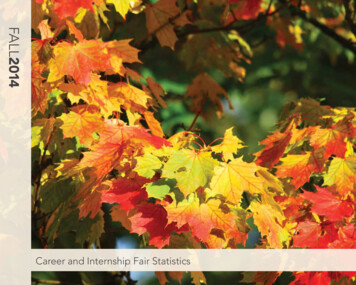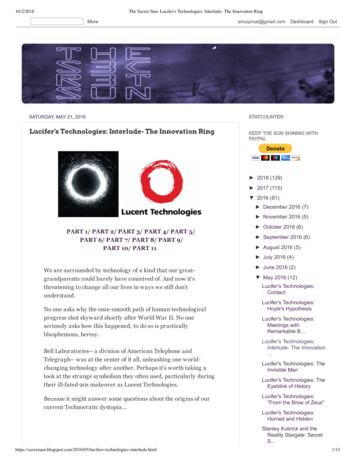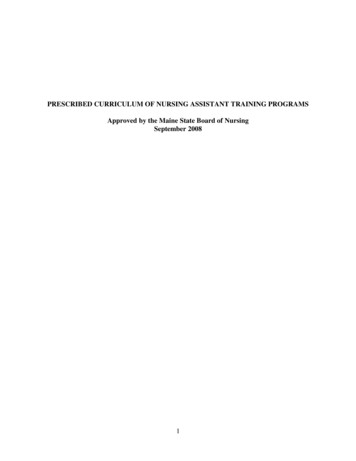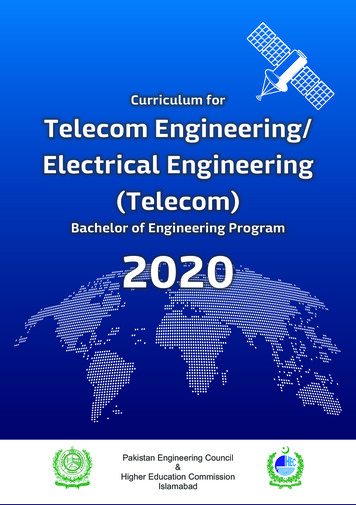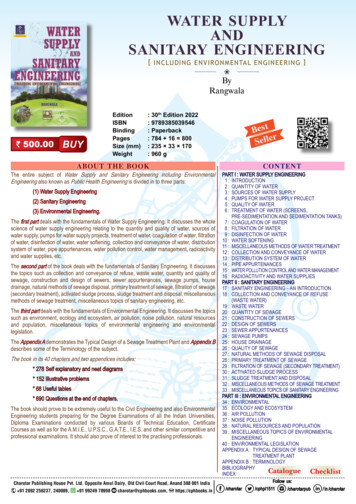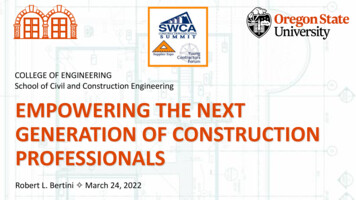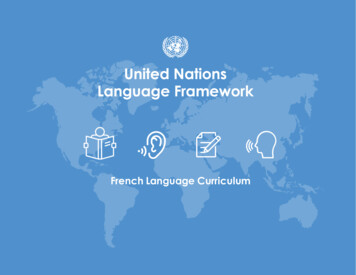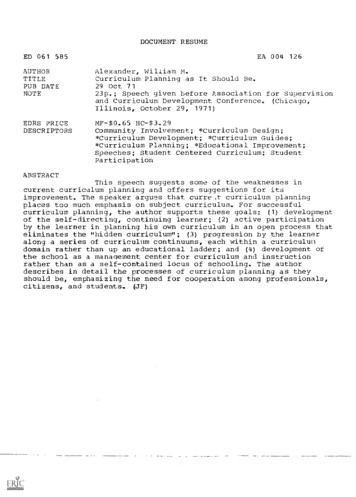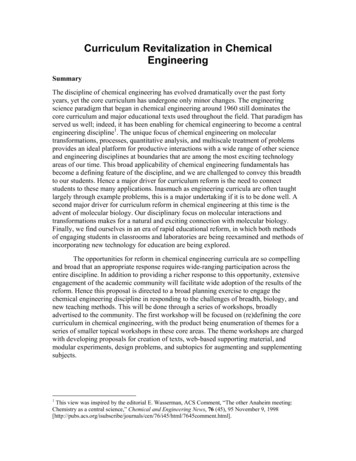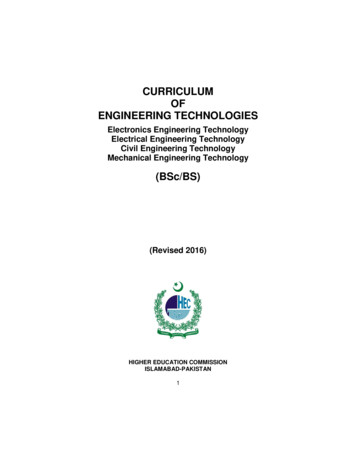
Transcription
CURRICULUMOFENGINEERING TECHNOLOGIESElectronics Engineering TechnologyElectrical Engineering TechnologyCivil Engineering TechnologyMechanical Engineering Technology(BSc/BS)(Revised 2016)HIGHER EDUCATION COMMISSIONISLAMABAD-PAKISTAN1
CURRICULUM DIVISION, HECProf. Dr. Mukhtar AhmedChairman, HECProf. Dr. Arshad AliExecutive Director, HECMr. Muhammad Raza ChohanDirector General (Acad)Ms. Ghayyur FatimaDirector (Curriculum)Mr. Riaz-ul-HaqueAssistant Director (Curr)2
PREFACEThe curriculum, with varying definitions, is a plan of the teaching-learningprocess that students of an academic programme are required toundergo. It includes objectives and learning outcomes, course contents,scheme of studies, teaching methodologies and methods of assessmentof learning. Knowledge in all academic disciplines is expanding and evennew disciplines are also emerging, it is imperative that curriculum aredeveloped and updated regularly.University Grants Commission (UGC) was designated as the competentauthority to develop, review and revise curricula beyond Class-XII videSection 3, Sub-Section 2 (ii), Act of Parliament No. X of 1976 titled“Supervision of Curricula and Textbooks and Maintenance ofStandard of Education”. With the repeal of UGC Act, the same functionwas assigned to the Higher Education Commission (HEC) under itsOrdinance of 2002, Section 10, Sub-Section 1 (v).In compliance with the provisions, the Curriculum Division of HECundertakes the revision of curricula after every three years, throughrespective National Curriculum Revision Committees (NCRCs) whichconsist of eminent professors, researchers of relevant fields from publicand private sector universities, R&D organizations, councils, industry andcivil society nominated by their organizations.In order to impart education at par with quality international standards,HEC NCRCs have developed unified templates as guidelines for thedevelopment and revision of curricula in the disciplines of BasicSciences, Applied Sciences, Social Sciences, Agriculture andEngineering in 2007 and 2009.It is hoped that this curriculum document, prepared by the respectiveNCRC’s, would serve the purpose of meeting our national, social andeconomic needs, and it would also provide the level of competencyspecified in Pakistan Qualification Framework to make it compatible withinternational educational standards. The curriculum is also placed on thewebsite of HEC (www.hec.gov.pk).(Muhammad Raza Chohan)Director General (Academics)3
CURRICULUM DEVELOPMENT PROCESSSTAGE-ISTAGE-IISTAGE-IIISTAGE-IVCURRI. UNDERCONSIDERATIONCURRI. IN DRAFTSTAGEFINAL STAGEFOLLOW UPAPPRAISAL OF 1STDRAFT BY EXPPREP. OF FINALCURRI.QUESTIONNAIRECOLLECTION OFEXP NOMINATIONUNI, R&D,INDUSTRY &COUNCILSCONS. OF NCRC.COMMENTSFINALIZATION OFDRAFT BY NCRCPRINTING OFCURRI.PREP. OF DRAFTBY NCRCREVIEWIMPLE. OFCURRI.Abbreviations Used:NCRC.National CurriculumRevision ncellor’s ommendationsLearning InnovationORIENTATIONCOURSES BY LI,HECResearch & Development OrganizationHigher Education Commission4BACK TO STAGE-I
CONTENTSS. No.Page No.1. Minutes of the meetings.2. Curriculum for BSc/BS Electronics EngineeringTechnology3. Details of courses4. Curriculum for BSc/BS Electrical EngineeringTechnology5. Details of courses6. Curriculum for BSc /BS Civil EngineeringTechnology7. Curriculum for BSc/BS MechanicalEngineering Technology8. Details of courses9. Annexure-A, B , C, D, E, F & G.10. Suggestions.11. Student Evaluation Criteria (Annexure-I)12. Generalized Semester Rules (Annexure-II)5
MINUTES OF THE MEETINGSThe preliminary meeting of the HEC National Curriculum ReviewCommittee (NCRC) for the subject of BTech was held at HEC Islamabadfrom 08th 10th June, 2015. Following is the list of participants;Dr. Muhammad Kamran,Professor,Department of Electrical & Electronics,University of Engineering & Technology,KSK Campus, Lahore.ConvenerMuhammad Munir AkhtarMS-Electrical EngineeringVice president PTC/HOD NEL LahoreSecretaryProf. Dr. Asif Ali ShahProfessor,Department of Electrical Engineering,Mehran University of Engineering & Technology,Jamshoro.MemberEngr. Badshah MunirChairman & Associate Professor,Department of Electrical EngineeringGovt. College of Technology, Kohat Road, PeshawarMemberEngr. Mohammad UsmanAssociate Professor,Department of Electrical Engineering,Balochistan University of Engineering & Technology,Khuzdar.MemberEngr. Abdul GhaffarAssistant Professor,Department of Tech,Government College of Technology,TEVTA, Samanabad, Faisalabad.MemberMohammad SadiqAssistant Professor,Department of Electrical Engineering,Government College of Technology,Kohat Road, Peshawar.Member6
Mr. Israr AhmadAssistant Professor,Department of Electrical Engineering,Government College of Technology,Panr, Mingora, Swat.MemberMr. Ikram Ullah KhanAssistant Professor,Department of Electrical Engineering,Government College of Technology,Dera Ismail Khan.MemberMr. Ghulam Rasool MakaVice Principal,Department of Electrical Engineering,Government College of Technology, SITE, Karachi.MemberMr. Mohammad Yaqoob RazaConvener (B. Tech),Pakistan Council of Technologists,Block No. 10, Flat # 14, Category-IV, I-9-/4,Islamabad.MemberMr. Nadeem WarsiAssistant Professor / HOD,Government College of Technology,SITE, Karachi.MemberDr. Salah UddinAssociate Professor,Department of Civil EngineeringBalochistan University of Engineering & Technology,BUET, Khuzdar.MemberDr. Aneel KumarProfessor & Co- Chairman,Department of Civil Engineering,Mehran University of Engineering & Technology,Jamshoro.MemberMuhammad Zafar IqbalAssociate Professor,Government College of Technology,Mardan Road, Nowshera.Member7
Engr. Shafi DurraniPrincipal,Department of Civil Engineering,Government College of Technology,Rasul, Mandi BahauddinMemberMr. Muhammad IsmailAssistant Professor,Government College of Technology,Peshawar, KPK.MemberDr. Muhammad AshrafAssociate Professor,Department of Civil Engineering,University of Engineering & Technology,Peshawar.MemberMr. Mohammad Khurshid ShinwariVice Chairman,Pakistan Council of Technologists,Block No. 10, Flat # 14, Category-IV, I-9-/4,Islamabad.MemberEngr. Mazhar Abbas NaqviPrincipal,Government Staff Training College,Peoples Colony-1, FaisalabadMemberDr. Faisal AmirDean / Assistant Professor,Department of Electronics & Power Engg,National University of Science & Tech.NUST-PNEC, Habib Rahmat Ullah Road, KarachiMemberMr. Ashraf KhanAssistant Professor,Government College of Technology,Near City Hospital, Kohat Road, Peshawar.MemberMr. Arshad HanifAssistant Professor / HOD,Department of Electrical Engineering,Government College of Technology, SITE, Karachi.Member8
Dr. Mohammad AmjadAssistant Professor,Department of Electronics Engineering,New Building, University College of Engg & Tech,B/J Campus,Islamia University Bahawalpur, Bahawalpur,MemberMr. Mohammad AbidAssistant Professor,Department of Electrical Engineering,Balochistan University of Engineering & Technology,Khuzdar.MemberMr. Khusro Hamid AliAssociate Professor,Department of B. Tech (Electronics),Government College of Technology,SITE, Karachi.MemberEngr. Muhammad Naeem-ul-HaqAssistant Professor,Department of Electronics Engineering,Government College of Tech, Seriab Road, QuettaMemberDr. Gulistan RajaProfessor,Department of Electrical Engineering,University of Engineering & Technology,Taxila.MemberDr. Hassan Ali Khan DurraniProfessor,Department of Mechanical Engineering,Mehran University of Engg & Tech, JamshoroMemberMr. Fazal-ur-RehmanAssociate Professor,Department of Mechanical Engineering,Government College of Technology,Dera Ismail Khan.MemberEngr. Liaquat Ali LehriChairman,Department of Mechanical Engineering,Balochistan University of Engineering & Technology,Khuzdar.Member9
Engr. Muddassir AhmadHead Academics,Karachi Tools, Dies & Module Center,Sector No. 38, NC # 24, Korangi Greek, Karachi.MemberMr. Mashal KhanAssistant Professor/Principal,Government Technical & Vocational College for Boys,BannuMemberEngr. Zubair Ahmad QureshiAssociate Professor,Department of Mechanical Engineering,Government College of Technology,Abbottabad.MemberEngr. Abbas SoomroAssistant Professor,Department of Mechanical Engineering,Government College of Technology, SITE,Karachi.MemberMr. Amjad MehmoodAssistant Professor,Department of Mechanical Engineering,Government College of Technology, Quetta.MemberEngr. Niqab KhanAsst. Professor,Department of Mechanical Engineering,Government College of Technology,Kohat Road, Peshawar.MemberDr. Riffat Asim PashaProfessor,Department of Mechanical Engineering,University of Engineering & Technology,Taxila.MemberDr. Khalid MahmoodMech EnggDept of Mech Engg EME College NUSTRawalpindi.Member10
DAY 1On 8th June meeting was started with the recitation of Holy Quran. Allparticipants were welcomed by Madam Ghayyur Fatima Director(Academics). After completion of the introduction. Dr. MuhammadKamran was selected as Convener of NCRC & Mr. Muhammad MunirAkhtar as secretary. Mr. Sadiq AP from GCT Peshawar raised question,whether previous NCRC-2010 had right to give such equivalencewithdrawal recommendation, house unanimously declared that, it wasnot fall under purview of the said committee. Moreover, differentschemes of studies were come into discussion & decided to work out forthe course.Later on Participants were divided into four groups for curriculumdevelopment, details as under;NCRC Sub-committee for B.Tech Electrical1. Prof. Dr. Asif Ali Shah,Professor,Department of Electrical Engineering,Mehran University of Engineering &Technology, Jamshoro.2. Engr. Badshah MunirChairman & Associate Professor,Department of Electrical Engineering3. Engr. Mohammad Usman,Associate Professor,Department of Electrical Engineering,Balochistan University of Engineering &Technology, Khuzdar.4. Engr. Abdul Ghaffar,Assistant Professor,Department of Electrical Engineering,Government College of Technology,TEVTA, Samanabad, Faisalabad.5. Mohammad Sadiq,Assistant Professor,Department of Electrical Engineering,Government College of Technology,Kohat Road, Peshawar.6. Mr. Israr Ahmad,(In Place of Mr. Abid Alam),Assistant Professor,Department of Electrical Engineering,Government College of Technology,Panr, Mingora, Swat.11ConvenerSecretaryMemberMemberMemberMember
7. Mr. Ikram Ullah Khan,Assistant ProfessorDepartment of Electrical Engineering,Government College of Technology,Dera Ismail Khan.8. Mr. Ghulam Rasool Maka,Vice Principal,Department of Electrical Engineering,Government College of Technology, SITE,Karachi.MemberMemberNCRC Sub-Committee for B.Tech Civil1. Mr. Mohammad Yaqoob Raza,ConvenerConvener (B. Tech),Pakistan Council of Technologists,Block No. 10, Flat # 14, Category-IV, I-9-/4,Islamabad.2. Mr. Nadeem Warsi,SecretaryAssistant Professor / HoD,Government College of Technology,SITE, Karachi.3. Dr. Salah Uddin,MemberAssociate Professor ,Department of Civil EngineeringBaluchistan UET, Khuzdar.4. Dr. Aneel Kumar,MemberProfessor & Co- Chairman,Department of Civil Engineering,Mehran University of Engineering & Technology,Jamshoro.5. Muhammad Zafar Iqbal,MemberAssociate Professor,Government College of Technology,Mardan Road, Nowshera.6. Engr. Shafiq Durrani,MemberPrincipal,Department of Civil Engineering,Government College of Technology,Rasul, Mandi Bahauddin7. Mr. Muhammad Ismail,MemberAssistant Professor,Government College of Technology,Peshawar, KPK.8. Dr. Muhammad AshrafMemberAssociate Professor,12
Department of Civil Engineering,University of Engineering & Technology,Peshawar.9. Mr. Mohammad Khurshid Shinwari,Vice Chairman,Pakistan Council of Technologists,Block No. 10, Flat # 14, Category-IV, I-9-/4,Islamabad.10. Engr. Mazher Abbas Naqvi,Principal,Government Staff Training College,Peoples Colony-1, FaisalabadMemberMemberNCRC Sub-Committee for B.Tech Electronics1. Dr. Faisal Amir,ConvenerDean / Assistant Professor,Department of Electronics & Power Engg,National University of Science & Tech.NUST-PNEC, Habib Rahmat Ullah Road,Karachi2. Mr. Ashraf Khan,SecretaryAssistant Professor,Government College of Technology,Near City Hospital, Kohat Road, Peshawar.3. Mr. Arshad Hanif,MemberAssistant Professor / HoD,Department of Electrical Engineering,Government College of Technology, SITE,Karachi.4. Dr. Muhammad Amjad,MemberAssistant Professor,Department of Electronics Engineering,New Building, University College of Engg & Tech,B/J Campus, Islamia University Bahawalpur,Bahawalpur,5. Mr. Mohammad Abid,MemberAssistant Professor,Department of Electrical Engineering,Balochistan University of Engg & Tech,Khuzdar.6. Mr. Khusro Hamid Ali,MemberAssociate Professor,Department of B. Tech (Electronics),Government College of Technology,SITE, Karachi.13
7. Mr. Khusro Hamid Khan,MemberAssociate Professor,Department of B. Tech (Electronics),Government College of Technology,SITE, Karachi.8. Mr. Engr. Mohammad Naeem-ul-Haq,MemberAssistant Professor,Department of Electronics Engineering,Government College of Tech, Seriab Road,Quetta9. Dr. Gulistan Raja,MemberProfessor,Department of Electrical Engineering,University of Engineering & Technology Taxila.NCRC Sub-Committee for B. Tech Mechanical1. Dr. Hassan Ali Khan Durrani,Professor,Department of Mechanical Engineering,Mehran University of Engg & Tech, Jamshoro2. Engr. Fazal-ur-Rehman,Associate Professor,Department of Mechanical Engineering,Government College of Technology,Dera Ismail Khan.3. Engr. Liaquat Ali Lehri,Chairman,Department of Mechanical Engineering,Balochistan University of Engineering &Technology, Khuzdar.4. Engr. Muddassir Ahmad,Head Academics,Karachi Tools, Dies & Module Center,Sector No. 38, NC # 24, Korangi Greek,Karachi.5. Mr. Mashal Khan,Assistant Professor/Principal,Government Technical & Vocational Collegefor Boys, Bannu6. Engr. Zubair Ahmad QureshiAssociate Professor,Department of Mechanical Engineering,Government College of berMemberMember
7. Engr. Abbas Soomro,Assistant Professor,Department of Mechanical Engineering,Government College of Technology, SITE,Karachi.8. Mr. Amjad Mehmood,Assistant Professor,Department of Mechanical Engineering,Government College of Technology, Quetta.9. Engr. Niqab KhanAsst. Professor,Department of Mechanical Engineering,Government College of Technology,Kohat Road, Peshawar.10. Dr. Riffat Asim Pasha,Professor,Department of Mechanical Engineering,University of Engineering & Technology, Taxila.11. Dr. Khalid MahmoodDepart of Mech Engg EME College,NUST Rawalpindi.12. Muhammad Yousif ShackhAsst. Prof Depart of Engg & Tech ay 2On 2nd day (9th June) Mr. Fida Hussain, DG Academics HEC, along withhis staff members joined NCRC meeting & concluded that as per HECpolicy guide line scheme shall be converted from Annual system tosemester system, therefore sub-committees continue their works tofinalize the courses.Day 33rd day B.Tech courses for Civil, Electrical, Electronic and Mechanical onsemester system basis were finalized. Group Conveners have taken theresponsibility to send course out lines and latest books details in onemonth time. Scheme of courses along with recommendation so far arebeing forwarded to HEC for their record. Complete curriculum may befinalized for implementation in upcoming B.Tech curriculum revisionmeeting which will be held later on.Recommendations1- As per direction of HEC, curriculum has been redesigned on thebasis of semester system.15
2-345-6-78910-11-1213-All colleges and Universities running this program should hire highlyqualified preferably PhD faculty in order to enable students to havebroader vision of course with practical knowledge.Institutes are advised to generate head for visiting faculty because ofunavailability of highly qualified faculty.Existing faculty should be given opportunity through FDP (FacultyDevelopment Program) to improve their qualification.It is strongly recommended that provincial TEVTA should support,enhance and strengthen laboratories and workshops in thesecolleges and universities in order to improve hands on skills ofstudents.Institutes are advised to update industrial linkage so that students intheir final semester may carry out their industrial trainingsuccessfully.An independent Liaison office should be established to havecontinuous monitoring of student training in industry.Students after completion of training must be evaluated by theexperts of academics and industry for semester grading.In order to ensure quality of program, affective regulatory body maybe constituted.As Laboratory staff play a vital role for smooth running laboratoriesand workshops, their proper training programs must be conducted onregular basis.Intake of students in B.Tech should be ensured that they might hadcompleted their DAE in English language. HEC may take up withTEVETAS & Technical Board for effective implementation.Majority of Committee members suggested that Intake qualificationfor B.Tech Program should be Diploma of Associate Engineer.A training/workshop may be arranged by HEC for Principal/chairpersons of Department/concerned faculty to understandsemester system rules and regulations as this system is being firsttime implemented for B.Tech.MINUTES OF 2ND MEETING OF NCRC B.TECH CURRICULUMMEETING HELD IN ISLAMABAD MAY 18-20, 2016It is continuation of the meeting dated 8-10 June, 2015A meeting of NCRC was held at HEC Islamabad from 18th 20th May,2016. Some new members joined us as under;1. Mr. Majid Zaman (in replace of Engr. Shafiq Durrani), MemberPrincipal,Department of Civil Engineering,Government College of Technology, Rasul,Mandi Bahauddin16
2. Mr. Aftab IqbalEminent Educationist ResearcherDepartment of Mech. Engg., University of Wah.Member3. Col Hafiz Sibhat-ullah FazilDepartment of Mech. Engg University of Wah.4. Dr. Moshsin TinwanaAsst. Professor,Depart of Mechatronics, NUST, IslamabadMemberMemberDAY 1On 18th May meeting was started with the recitation of Holy Quran. Allparticipants were welcomed by Mr. Muhammad Raza Chohan, DG(Academics) HEC & this meeting was coordinated by Madam GhayyurFatima, Director (curriculum) HEC. After completion of the introduction,Mr. Raza Chohan invited Maj Gen.(R) Akbar Saeed Awan, Chairperson(National Technology Council) for inaugural address to the participants.Chairperson NTC elaborated Council functions & objectives and addedthat courses to be developed in a way that may serve the country andmet the international standard i-e Sydney Accord. Further chairman NTCadvised that one year supervised industrial training to be incorporated indegree program and also that their degree nomenclature shall be theB.Sc Engineering technology to make ensure uniformity of the programsat country level. Therefore, supervised industrial training was inducted in7th & 8th semesters. Sub-committees started their work and finalized thecourse structure.Day 2On 19th May, 2016 courses out lines were developed keeping in view therequirement of country and latest available text books. Furthersemester’s rules and student evaluation criteria for supervised industrialtraining was also circulated among the all sub-committees for commentsand finalization.Day 3On 20th May, 2016 a presentation was given by Dr. Mohsen TiwanaNUST Islamabad on Sydney Accord. After presentation, curriculumfinalization was done. Curriculum and recommendations received fromNCRC and sub-committees are attached herewith.Recommendations:1- In continuation of previous NCRC held in June 2015, curriculum isdesigned on semester system basis.2- As per advice of Chairman NTC and keeping in view the SydneyAccord, last two semesters of all technology programs are comprised17
of supervised industrial trainings to keep psychomotor (Hands on)factor on higher side.3- It is strongly recommended that Universities and Colleges runningtechnology programs should appoint highly qualified preferably PhDfaculty in order to enable students to have broader vision of coursewith practical knowledge.4- If Institutes don’t have very qualified faculty, they should appointvisiting faculty.A proper head for visiting faculty should begenerated as recommended in previous NCRC meeting held in June2015.5- Existing faculty of technology programs should be given opportunitythrough FDP (Faculty Development Program) to improve theirqualification.6- It is strongly recommended that provincial TEVTA, HEC and NTCshould support, enhance and strengthen laboratories and workshopsin these colleges and universities in order to improve hands on skillsof students.7- Institutes are advised to update industrial linkage so that students intheir 7th and 8th semester may conduct successfully.8- HOD/ Chairman of the Department should establish a Liaison officefor correspondence and monitoring of student’s participation andcontribution towards learning.9- Students after completion of training must be evaluated after 7th and8th semester by the experts of academics and industry for semestergrading. Evaluation criteria is given in Annexure-I.10- Laboratory staff should be put through proper training of labequipment for its smooth utilization. Staff should be vigilant andresponsible to update stock register for addition and deletion of anyequipment and components and to inform laboratory director.11- It is recommended that intake of students in B-Tech of alltechnologies should be ensured that they might had completed theirDAE in English language.12- A copy of generalized semester rules has been circulated. However,a training/workshop may be arranged by HEC for collegeprincipals/Chairpersons to understand semester system rules andregulations.18
BSc/BS ELECTRONICS ENGINEERINGTECHNOLOGY1st SemesterSNCourseCodeSubjectNatureWeeklyCredit HoursTheorPrayctical20Credit nSkills(Humanities/English)2ELH121Islamic (NaturalScience)30304ELS143Applied n)02017ELT133Introduction ectrical ringFoundation)3231TotalGrand Total150815 08 2315415 04 192nd 171ELT134TechnicalReport WritingAppliedMathematics-IIPAK ties)ElectricalTechnology – neeringFoundation)3231Digital alMachinesPCB Designand ringFoundation)3231020119
Total140814 08 22Grand Total14414 04 183rd Technology ices s(Major basedBreadth)ELT244Instrumentation &Measurement(Major basedBreadth)5Credit 1221Total222323113Grand Total11013 10 2313513 5 184th T283SubjectCommunication SystemsandTechniquesControlTechnology(Major basedBreadth)Electromagnetic FieldTheory(Major basedBreadth)Amplifier &Oscillators(Major rsThePractoryicalCredit HoursTheory323323Practical1120202221
ELT294PowerElectronics5(Major basedBreadth)TotalGrand Total3231130813413 08 2113 4 17WeeklyCredit HoursThePractoryicalCreditHoursThePractoryical5th pliedAntenna rofessionalEthics(Major basedDepth)323132313231(Major basedBreadth)3231(Humanities)202014081404(Major basedDepth)(Major basedDepth)TotalGrand Total12 08 222114 04 18
6th tELT3642ELT3743ELT38445WeeklyCredit lAutomation andRoboticsFPGABasedSystems(Major basedDepth)3231(Major basedDepth)3231CommunicationNetworks(Major hnology(Major ciences)14 08 22Grand Total14 4 187th SemesterSNCourseCodeELT4721SubjectWeekly Credit talCredit HoursThe- Practicalory03201600320016Grand Total00 32 322200 16 16
8th ialTrainingTotalGrand TotalWeekly Credit HoursTheoryPracticalCredit HoursTheoryPractical032016003201600 32 3200 16 16Total Credit Hours 140DETAIL OF COURSES1st SemesterELH-111ELH-121ELS-133ELS-143Technical Communication SkillsIslamic StudiesApplied Mathematics –IApplied ves: The main objective of the course is to provide basicinformation about Electricity, Magnetism, Electromagnetism, waves andoscillations, optics, Electronics and Mechanics to the students.Course Outline:Waves & Oscillations : Periodic motion & Simple Harmonic Oscillation(SHO), Simple Pendulum, Transverse & Longitudinal Waves, Speed of atraveling Wave, Damped Harmonic Oscillator, EM waves.Electricity: Basic terms & definitions; Electric Forces and Fields, ElectricFlux, Coulomb’s Law, Electric field due to the Point and VariousCharges, Gauss’s Law and its Applications, , Conductors in ElectricFields, Parallel Metal Plates ,Capacitance , Resistance, Electric Potentialand Potential Energy, Ohms’ Law, practice problemsMagnetism: Magnetic Field, Flux and Flux density (B), B-H loop,Hysteresis, Retentively, Magnetic Force on moving charges, Torque onCurrent Loop, Ampere’s Law, Magnetic Dipole Moment. Earth’s MagneticField, practice problems,Electromagnetic Induction: Induced Current and EMF, Faraday’s Law ofElectromagnetic induction, Lenz’s Law, Mutual and self-Inductance,Motional EMF, Inductor and Inductance, RL circuits23
Electronics: Semiconductor materials, conduction in conductors,insulatorandsemiconductors, doping, N-typeandP-typesemiconductors, energy band diagrams of conductors, insulators,intrinsic and extrinsic Semiconductors, PN junction, basic diodeoperation, forward and reverse operating modes, Diode applications.Light and Optics. Oscillating Electric and Magnetic Fields, Light as EMWave,Reflection, Refraction, Interference, Young’s Double SlitExperiment, Equivalent Optical Path, Diffraction,Mechanics: Definitions of Work, Energy & Power, Work – EnergyTheorem and its applications, Mechanical Energy of System,Conservation of Mechanical Energy, practice problems, Gravitationalpotential energy, Hook’s Law & Restoring force. Review of AngularVariables, K.E. Energy of Rotation and moment of Inertia, Torque andNewton’s Second Law of Rotation, Work and Rotational K.E., Angularmomentum, Angular Momentum for System of Particles.Lab Outline:1. Measuring magnitude and direction of Earth’s a) magnetic field. b)To measure Dip angle.2. Examining Lenz’s and Faraday’s Law. Studying the production ofEMF using fix coil or fix magnet3. Measurement of Current, Voltage drop and Power in a Resistancecircuit4. Diode; identification of Diode terminals using Ohm meter seriescircuits, Diode series circuit, Diode Parallel circuits5. Half Wave rectification and Full Wave rectification6. Measurement of wavelength of sodium light using diffraction Gratingand Spectrometer7. Study of diffraction minima and maxima using single and multi-slits.8. Verification of Law of Conservation of Energy by measuringpotential and kinetic energies in various arrangementsa)Determine relationship between force and spring deformation usingHook’s law. b) Investigating both spring compression and extension.Recommended Books:1. Halliday, Resnick and Walker, "Fundamental of Physics"(Latest Ed.)2. Electrical Technology, Edward Hughes ,Longman Latest edition,3. Principles of Electrical Engg.,B.R Gupta ,S. Chand andCompany Ltd. IndiaELT-113INTRODUCTION TO COMPUTERS TECHNOLOGYObjectives:To assemble or disassemble computers and plug-in devices. Enablestudents to design an optimal computer system environment as per need24
of customer. Pros and cons of computer business and applications.Course Outline:Basic terminology: computer, user, hardware, software, chip, program,Input: data, instructions (programs, commands, user responses), Output:text, graphics, video, audio, Types of computers: personal, notebook,handheld, PDA, internet appliance, server, mainframe, supercomputer,Programming languages, Machine, assembly, High-level, Key terms:VLSI, microprocessor, microcomputer, Computer Software: Terms: file,menu, font, voice recognition, FAQ, online help, wizard, software suite,single-user license, site license, application window, dialog box, clip art,cross-platform application, Application software, Word processing,Spreadsheet: cell, function, recalculation, charting, Database: record,field, query, Other: accounting software, Computer Aided Design (CAD),desktop publishing, paint/image, multimedia, web authoring, Systemsoftware, Operating System (OS), Booting (startup), Cold vs. warm,BIOS, Steps in booting, Utility programs: file viewer, file compression,backup, screen saver, disk scanner, disk defragmenter, Computerhardware, System unit Terms: motherboard, chip, memory, storage,expansion slot (plug and play), port (serial vs parallel), bus (expansionbus), power supply, Central Processing Unit (CPU), Machine cycle(fetch, decode, execute, store), Memory, Volatile vs. nonvolatile, RAM vsROM, Cache, Hard disk, Tracks, sectors, platters, RAID (mirroring andstriping), Internet hard drive, Compact disks (and drives), PC Cards,Miniature mobile storage (Compact Flash, Memory Stick, Microdrive,Smart Media), Input Devices: Keyboard, Poin
NCRC Sub-Committee for B. Tech Mechanical 1. Dr. Hassan Ali Khan Durrani, Convener Professor, Department of Mechanical Engineering, Mehran University of Engg & Tech, Jamshoro . Department of Mechanical Engineering, Government College of Technology, SITE, Karachi. 1- 8- 1- TECHNOLOGY English) Technology (Engineering (Engineering Electrical .
